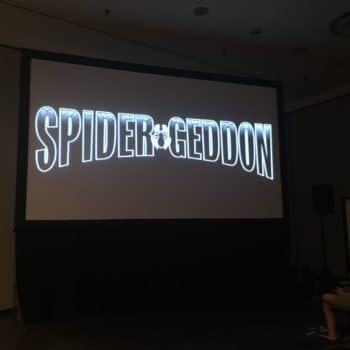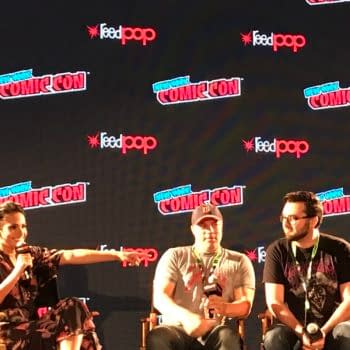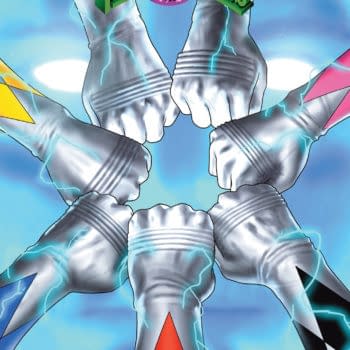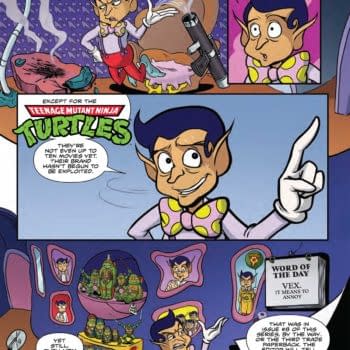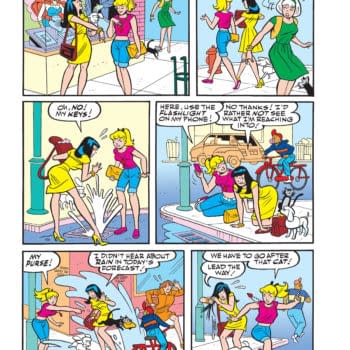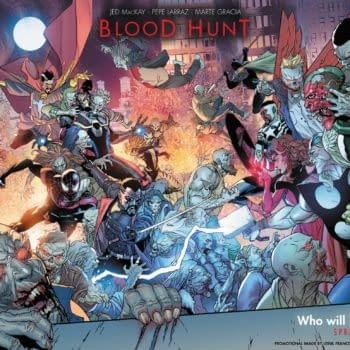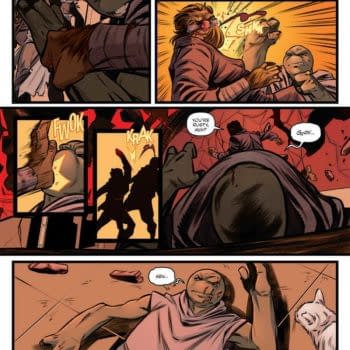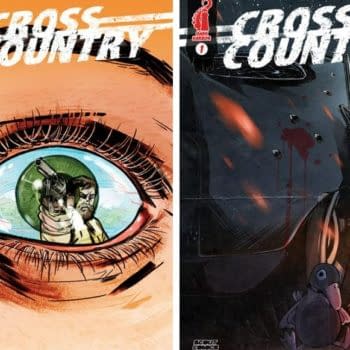Posted in: Comics, Recent Updates | Tagged:
Entering Peter J. Tomasi's House of Penance
By Octavio Karbank
Peter J. Tomasi has worked on some iconic books over the years. From serving as an editor at DC Comics, to jumping to the other side of the desk and penning comics like Superman/Wonder Woman and Batman and Robin; the man has talent. Now comes his latest work from Dark Horse Comics: House of Penance. Coming out April 13, this Wednesday in fact, the story is a dark, creepy, and loads of fun! Here's what Mr. Tomasi had to say about his newest comic book.
OK: What is House of Penance about?
Peter J. Tomasi: House of Penance is really about Sarah Winchester, heir to the Winchester Rifle fortune; it's a complete story about obsessiveness and redemption. I think those are the two main themes. We watch this woman try to escape what she feels is a blood curse over her name, herself, and the family. She tries, in her own idiosyncratic way, to escape it and keep it at bay.
I haven't read a lot of horror stuff in a while; I used to really love a lot of it. These days it seems that they tend to think it's enough to just show some slice and dicing and that's it. To me, a good horror story is really about character first. If you're invested in those characters, as they go through something horrific, I think it ups the ante so much more
OK: How many issues will House of Penance be?
PT: It's actually a six-issue series. I just look at it as a complete story about this woman, the house, and the characters that sort of inhabit the place. Right now, we're in a great position where the artist is already done with the fifth issue. In terms of deadlines there won't be any wait on the stands for this. People will be able to go and pick it up on schedule.
OK: What inspired the comic?
PT: It was one of those happenstance occurrences. I was up North in California, and we were visiting John Steinbeck's house, this was many years ago, and during the course of the tour, one of the tourists mentioned they'd just come from the Sarah Winchester house in San Jose. They kept going on about it and I thought it sounded pretty cool. We drove to it the next day, but it was closed. Only many years later would I be able to take a personal tour of the house and really get Sarah's hook into me at that point. After I first heard about the house, I started to look into it a little bit and always kept a little notebook with my ideas stuff in it, jotting down idea, themes, or characters that popped in my head. It's sort of a constant, running idea of the story that kept kind of calling out to be written. I think when I was ready to really sit down and write it, it all came out and it was great and a lot of fun to write.
OK: With all the years you've spent on the story, has it become personal to you?
PT: Yeah, it definitely has. When you work on something that long, the characters start to get into you after awhile. In a weird way, I felt she was clawing at my brain to finally get that story out. I've heard some people want to do a movie on it, but they wanted to do it in the present day and only harken to the past. I thought it would be a shame not to set it in her time period and approach it from that angle. It's cool, because when I went into the house, her personality really grabs you and you really feel it. It's like a right hook to the head. The furniture, all the detail and carving and woodwork, the layout, with stairways to nowhere, and doors leading to three-story drops; it gives you a glimpse into this person's mind and this obsessiveness. The way I look at it at least, it's this person who's also fearful, and running from something that she really thought was out to get her. In her mind, it had taken her husband and her child, earlier in her life. As the story builds and cool things get revealed, there are some real, true-to-life stuff that intrudes on the timeline; that is amazing. It almost felt like it was a perfect third act. There's something huge that interests with her time and that house, it's amazing!
OK: Other comics you've worked on, like Nightwing and Superman/Wonder Woman have some horror elements to them. Why the departure from superhero books and into horror?
PT: It sort of came to pass because I'm a big historical-fiction nut; I love history and reading about the past, especially American history. I've written a bunch of things, dealing with history, and even stuff I've written for DC, superhero-wise, had little tidbits here and there. In a book like Light Brigade, that I did a couple years ago, it was based in World War II and is another example of that. It's nice to get out of the wheelhouse sometimes and try something else. I think it feeds each other, when you're writing one particular thing for so long, going off and doing something completely different; helps to make you a better writer when you can mix it up.
OK: So how do you approach writer horror as opposed to something of the superhero or historical genre?
PT: The first thing I always start with, with any of them, is the character. I'm not a heavy plot person. It's weird, I'll have a beginning and ending and from there I let the characters take me on a journey. I have to say, that also happened with House of Penance too. There's not a lot of historical record on Sarah Winchester, so I took the template of her life story and fictionalized it and added several distinct elements, like the character of Warren Peck. As a young kid, he was an army sniper, and then worked for the government. He basically got people off the land for manifest destiny purposes, be it Indians or settlers taking parts of the land they shouldn't be on, and then having him also be on a quest for redemption. Him and Sarah are on two parallel tracks. In their minds, they're both covered in blood and looking for penance and redemption. The house offers that in spades, obviously. One of the things I really enjoyed was all the "blamming", as they call it; it's all the work and construction on the house, 24/7, every day, every week, and around the clock, for thirty-eight years actually. All of that sounds like gunshots, the constant hammering, and all these workers are not just workers. I came up with the idea of them all looking for penance in their own way; looking for penance for blood they've spilled. They've sort of been drawn to the house as a beacon, as a lighthouse, that's sort of calling to them to try and shed their sins and try to stop from drowning in the blood they've spilled over all those years.
OK: Was House of Penance written with a specific audience in mind?
PT: No, I don't think so. I usually don't have an audience in mind when I write stuff, like some writers do. It sounds a little old fashioned, but I think that if you spin a good yarn and try to tell a good story with people you can really be invested in, care about, and want to watch go through something, be it an adventure or journey, then I think that's really it. I'm not the kind of person who limits their reading or their movie-going. If it's good, I'm there. It's crazy to limit oneself and not to immerse yourself in so much cool stuff that's out there.
OK: You've gone from being a senior editor at DC Comics over to freelance writing. Can you talk about that?
PT: It was just sort of timing. I'd been writing while I was on staff, which was pretty rare. DC and Marvel were very different in that regard. I was lucky that there were several editors, Paul Levitz specially, who was very kind and let me write, because he knew that I wasn't just doing it for a paycheck, but had a real passion for it. I was never going to blast through anything just to blast through anything; I was always going to give him my best. So DC was kind enough to let me do projects while I was on staff, but one day I finished up something and was scoping around to see what I could do next and Dan DiDio said, "Hey, we could use you on the other side, just creating stuff for us, what do you think?" But I'd already been there for fifteen years, so I really loved my job, but it ended up being a thing where I had to just ask them to let me go write stories and see how it went. It's been almost ten years later and it's been a great ride so far, being on both sides of the desk.
OK: And how is it working with Ian Bertram, the artist on House of Penance?
PT: Amazing guy. Somebody turned me onto him. I was trying to find somebody to do the book and I wanted somebody off-kilter a little bit, somebody who didn't have a regular meat and potatoes kind of approach. I was pointed onto a book he was doing called Bowery Boys. I checked it out and really enjoyed it.
He lives in Brooklyn, I live in New York, so we went to lunch and we talked. I looked at his sketchbook and it was perfect. He completely blew me away. His stuff comes in and it really does what you want as a writer. When an artist comes in and makes the story so much more, making it horrific, but humanistic…you really can feel the pain behind this woman's eyes. You don't get that a lot in some books. It's hard to pull off and I think the real small human, intimate moments, he's really pulling off. It's a hell of a creepy book. I'm so happy with it! When I saw Ian's stuff come in, and then the color by Dave Stewart, I was like, "Wow, this is even crazier, creepier, and more horrific than I could ever imagine!"
OK: What makes for a great writer?
PT: I don't know. I mean, I don't know if I'm a great writer, that's for sure. I feel that I'm a solid writer. A good writer, and this sounds cliché, but a good writer needs to write, read, and listen. I think those are the tenants of it. You've got to listen to people talk for dialogue; you've got to read to get a sense of the world. You need to keep yourself open to experiences and not let yourself get bogged down in the genres that you love so much. When I was an editor, I used to tell that to writers and artists, where I'd read comic scripts or look at comic art and it would look almost too comic book-y and I would say, "Just draw from real life. You're looking at comic stuff too much; let yourself look at other things".
Octavio Karbank is a writer and bona fide Whovian. Living in Massachusetts, you can find him on Twitter @TymeHunter and his blog www.cozmicventures.com







